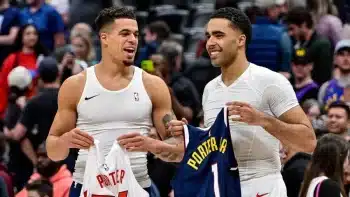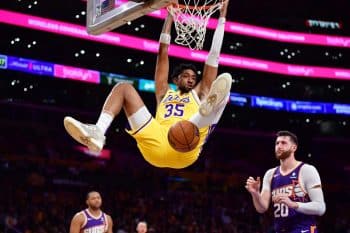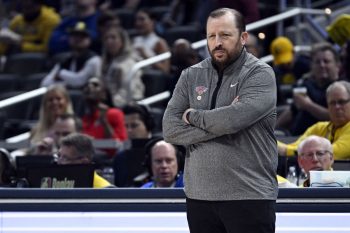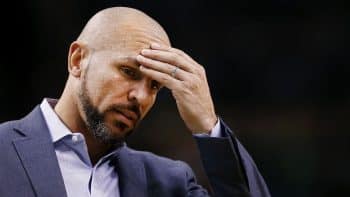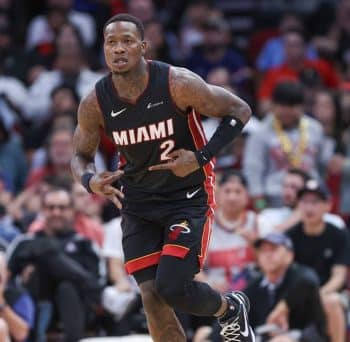NBA
Phoenix Suns 2018-19 NBA Season Preview

The Phoenix Suns had quite the offseason, to say the least. After winning just 21 games last season, the Suns landed the top overall pick in this year’s draft and selected Deandre Ayton. Phoenix also named Igor Kokoškov as the team’s new head coach, made a draft day trade for Mikal Bridges (Zhaire Smith (16th pick) and a Miami HEAT 2021 first-rounder to the Philadelphia 76ers for the rights to Bridges (10th pick)), drafted Elie Okobo 31st overall, signed veteran forward Trevor Ariza to a one-year, $15 million contract, came to terms with Devin Booker on a five-year, $158 million extension, traded Marquese Chriss and Brandon Knight to the Houston Rockets for De’Anthony Melton and Ryan Anderson, traded Jared Dudley and a protected 2021 second-rounder to the Brooklyn Nets for Darrell Arthur and traded $1 million to the 76ers for Richaun Holmes. Notable players not returning from last season’s roster include Alex Len, Elfrid Payton and Tyler Ulis, as well as the aforementioned Chriss, Knight and Dudley.
The Suns were clearly one of the busier teams this offseason, but it’s not exactly clear that all of their activity fit within a well-reasoned vision of the future. With the Western Conference as talented and deep as ever, Phoenix could have invested all of its resources in young talent with an eye toward the future when some of the Western Conference powerhouse teams are on the downswing. Instead, the front office bolstered its young core while also pursuing veteran talent to compete this upcoming season. Only time will tell whether Phoenix’s offseason strategy will prove successful both in the short and long term.
With all of this in mind, let’s take an early look at what will be in store for Phoenix this upcoming season.
FIVE GUYS THINK…
Phoenix hasn’t won more than 24 games in a single season since the 2014-15 campaign, so it’s no wonder the team is aching to become competitive again. While I am not sure bringing in Trevor Ariza on a one-year, $15 million contract makes a ton of sense, I do think he can be a good mentor for younger forwards like Josh Jackson, Mikal Bridges and T.J. Warren. I also like that Phoenix overpaid Ariza on a one-year deal rather than committing to him for several season at a lower annual rate.
Bringing in De’Anthony Melton in the trade for Anderson is a nice addition. As of now, Phoenix projects to enter the season without a clear option at the starting point guard position. Booker could slide into that role but it’s not certain he could handle the lead guard position consistently the way James Harden and other non-traditional point guards have in the past. I would not be surprised to see Phoenix aggressively pursue a more established point guard while looking to Melton and Okobo to develop into starting-quality point guards in the near future.
Big picture: Phoenix did well long-term in adding young talent in Ayton, Bridges, Okobo and Melton but may regret investing so much of its resources into trying to be competitive this season in the stacked Western Conference.
4th Place – Pacific Division
– Jesse Blancarte
If the goal was to take a step forward, then mission accomplished for Phoenix, I guess? The Suns certainly kept themselves busy since their season ended, adding plenty of dependable and/or promising wings and bigs. The one snag is that the overabundance of wings and bigs on the roster came at the expense of their guard depth. Phoenix doesn’t have many guards to complement Devin Booker with all they lost. If the roster stands as is, then the Suns may rely on positionless basketball, which could make them more fun to watch. Improvement is on the horizon, but for now, its baby steps for the Suns.
4th Place – Pacific Division
– Matt John
Even in a loaded Western Conference, it seems the Suns are looking to become a bit more relevant on the court for the first time in several years. Signing a veteran like Trevor Ariza on a big one-year deal, then making a move for Ryan Anderson from Houston to round out a sneakily strong group of shooters, signaled aspirations of at least something more than what we’ve seen over the last few seasons. Moving Brandon Knight out in that same Anderson deal would seem to be an indication that the Suns are leaning toward putting the ball in Devin Booker’s hands as the lead handler from the get-go, and Phoenix will be banking on some new life injected into their youth by new head coach Igor Kokoskov – Booker first and foremost. If Kokoskov can continue to hone his young star’s already-potent offensive game while perhaps refining his play on the defensive side, the Suns will have the foundational piece they’ve committed gigantic money to for the next several years. Whether they’re able to threaten for a playoff spot this year or not, it’s clear the Suns are looking to turn the culture around moving forward.
4th Place – Pacific Division
-Ben Dowsett
For the first time in three years, it feels like the Suns are going to create an identity. There is a youth movement across the board from the players all the way to the coaching staff. It’s not going to all come together in the first year under Igor Kokoskov, but Devin Booker’s on the rise and Josh Jackson is coming into his own. On top of that, having top overall pick Deandre Ayton and fellow first-rounder Mikal Bridges learning under wily veterans like Tyson Chandler and Trevor Ariza should kickstart things in the desert.
4th Place – Pacific Division
– Spencer Davies
If the Phoenix Suns were in any other division, it would be easier to see them climbing out of the basement into the playoff discussion, but in the Pacific, they are still the basement, but with a much better forward-looking future. The draft yielded a ton. The new coaching staff should install a fun brand of basketball and the Suns’ future should be on full display every night. They may not win more than 25-30 games, but they look to be in a much better place than they were this time last season.
4th Place – Pacific Division
– Steve Kyler
TOP OF THE LIST
Top Offensive Player: Devin Booker
At age-21, Booker already has the complete package on offense. He is a pure shooter who can knock down shots off the dribble, out of catch-and-shoot situations and while flying off of screens. Booker is also a solid playmaker and effective operator out of the pick-and-roll. He doesn’t have elite athleticism but he has a nice feel for the game and uses his change of pace to create space and attack the rim effectively. Coach Kokoškov is sure to build his offense around Booker and put his young star guard in a position to fully utilize his dynamic offensive skill set. Phoenix’s offense will go as Booker goes, especially until the team acquires an established starter at point guard.
Also, in case there is any doubt about Booker’s offensive talent, let’s not forget he scored 70 points against the Celtics in Boston on March 24, 2017.
Last season, Booker averaged 24.9 points and 4.7 assists per game while shooting 43.2 percent from the field and 38.3 percent from three-point range.
Top Defensive Player: Trevor Ariza
Let’s be clear, Ariza is not the defensive player he was earlier in his career. However, at age-33, Ariza is still an effective defender on the wing and against bigger forwards in the post. Additionally, Ariza comes to Phoenix after being part of Houston’s elite defense, which ranked sixth overall last season in defensive rating. Ariza was a key part of Houston’s switch-heavy schemes, which managed to slow down the Golden State Warriors in the Western Conference Finals and put Houston in striking distance of the NBA Finals.
Ariza isn’t going to lockdown opposing team’s star guards and forwards on a nightly basis, but he will hold his own and work within the team’s defensive schemes. Ariza could also act as a mentor to Phoenix’s young forwards, including Warren, Jackson and Bridges and could help them develop good habits and improve as defenders as well.
Top Playmaker: Devin Booker
Without a starting caliber point guard currently on the roster, Booker takes the nod as the team’s best playmaker. Booker has good vision, is an underrated passer and if often methodical while probing opposing defenses. His offensive abilities often cause defenses to scheme towards stopping him from scoring as a top priority, which can lead to easy scoring opportunities for his teammates. With more talent around him this season, Booker needs to make a more concerted effort to be a consistent playmaker and facilitator for his teammates. If he manages to do so, his offensive impact will hit another level, even if his per game scoring average takes a slight dip from last season.
Top Clutch Player: Devin Booker
In year’s past, players like Eric Bledsoe or Goran Dragic could have made a claim as being Phoenix’s top clutch player. However, Booker has hit some big time shots in clutch situations over his young NBA career and is the most capable scorer and playmaker Phoenix has at this point. Booker hasn’t always been the most efficient scorer in clutch situations, but there is little doubt that he is the most capable offensive player Phoenix has and the person who should have the ball in his hands when the game is on the line.
The Unheralded Player: De’Anthony Melton
When the Suns traded Marquese Chriss and Brandon Knight to the Houston Rockets for Ryan Anderson and De’Anthony Melton, most of the attention fell on everyone but Melton. Melton is a talented combo guard who was sidelined all of last season at USC because of a federal investigation into the NCAA. Had Melton not been sidelined, he would have had more of an opportunity to show NBA teams that he was arguably worthy of a first-round pick in this year’s draft. Instead, Melton dropped on draft night and was selected 46th overall by the Houston Rockets.
Melton participated in the Las Vegas Summer League with the Rockets and had some standout performances. At Summer League, Melton averaged 16.4 points, 7.2 rebounds and four assists and demonstrated a nice feel for the pace and tempo of the game.
Melton will compete with Elie Okobo, Shaquille Harrison and Isaiah Canaan for playing time at the point guard position.
Best New Addition: Deandre Ayton
There are some skeptics who don’t believe Ayton has the skill set or drive to be a star player at the NBA level. However, the majority of scouts and other player evaluators had Ayton as the consensus top pick in this year’s draft – a conclusion Phoenix clearly agreed with.
Ayton stands at 7-foot-0 with a 7-foot-5 wingspan. He has a big, muscular frame but still has plenty of room to continue developing his body. Ayton is also extremely athletic, coordinated and nimble for a player his size. If Ayton can become a more consistent weak side defender, improve his consistency in making the correct defensive rotations and improve on his rebounding fundamentals, he could possibly become a Rudy Gobert level defensive anchor someday. No one should expect Ayton to reach Gobert’s level but it’s a possibility and that alone was reason enough to take him with the first overall pick.
Ayton also has a surprisingly diverse offensive skill set but he isn’t great at any particular thing yet on that end of the court. However, Ayton is a big-time threat as a rim-roller and should get plenty of opportunities to finish lobs from teammates over the course of the season.
Ayton may not be ready to contribute at a high level in his rookie season, but he has star potential and that alone makes him the team’s best new addition.
– Jesse Blancarte
WHO WE LIKE
1. Devin Booker
For all of the reasons we have already discussed above.
2. Deandre Ayton
In Ayton, Phoenix finally has a second young prospect with star potential. There is no guarantee that Ayton ever becomes anything more than a starting quality center but between his physical gifts and improving skill set, it’s possible he could become an All-Star caliber player in the near future. Additionally, if Ayton reaches his defensive potential, he could become the defensive anchor that Phoenix needs as Tyson Chandler is no longer the defensive ace he once was and is only under contract for this season.
After seemingly missing the mark by using top picks on big men like Alex Len, Marquese Chriss and Dragan Bender, Phoenix is hoping that Ayton’s game will translate to the modern NBA. If it does, Ayton could become part of a formidable duo with Booker.
3. Mikal Bridges
Phoenix traded a promising player in Zhaire Smith and a valuable Miami 2021 first-round pick for Bridges, which is a somewhat steep price to pay. But it’s not hard to understand why Phoenix was willing to pay this price for Bridges. He is a prototypical 3-and-D prospect with the potential to develop into a capable playmaker. When I think about Bridges, I think of Kris Middleton. I don’t know whether Bridges will ever develop into the kind of player Middleton has become, but he has deep range on his jumper, is a confident shooter and looked comfortable getting his shot off quickly at the Las Vegas Summer League.
Depending on how Bridges and Smith develop over the next few seasons and what becomes of that Miami draft pick, Phoenix may come to regret making this deal. But Bridges is a quality prospect that should make a lasting impact in Phoenix.
4. T.J. Warren
Warren is now entering his fifth NBA season and while he has shown some flashes of his unique offensive skills, he has yet to establish himself as a reliable starter at the forward position. Injuries have limited Warren, who has never played in more than 66 games in a season. However, this could be the year where Warren starts to fully and consistently utilize all of his offensive skills, including his ability to score off the dribble, in the midrange and at the rim. Warren is a poor shooter from three-point range but his brand of offense keeps opponents off balance, making him a tough matchup for many players who are used to running players off the three-point line and trailing them to the rim rather than guarding them in the midrange and in the post.
STRENGTHS
Young talent. The Suns feature one of the better young cores in the NBA and are now guided by a promising head coach in Igor Kokoškov. While the Suns brought in Ariza and Anderson to add veteran experience and depth to the roster, it’s unlikely they alone will be able to help the Suns maintain pace in the Western Conference playoff picture this season. However, if Ariza, Anderson and Chandler can help mentor the younger players and build a strong team culture, this team could conceivably outperform expectations. But even in the best case scenario, the playoffs don’t seem like a realistic goal for Phoenix this season considering how many young players the team is relying on to play heavy minutes and how stacked the Western Conference is.
If the Suns see meaningful development from their young core players, this season should be seen as a success even if Phoenix misses the postseason.
– Jesse Blancarte
WEAKNESSES
Point guard. As previously discussed, the Suns are projected to enter the upcoming season without an established starter at point guard. Booker could slide into the lead guard position but there is no guarantee he is ready to take on that taxing role. Phoenix has promising prospects in Okobo and Melton, but neither player is likely ready to take on the starting position and perform at a league average level consistently. Phoenix is rumored to be seeking out a quality point guard but until such a deal has been agreed to and finalized, point guard play is likely going to be an area of concern for the Suns.
– Jesse Blancarte
THE BURNING QUESTION
Will Phoenix regret investing significant resources into veterans like Trevor Ariza?
Phoenix wasn’t a team that was one or two quality veterans away from becoming a contender, which is why some people in and around the league have questioned the wisdom of Phoenix’s signing of Ariza and trade for Anderson. Notably, Ariza’s contract is only for this season and Anderson’s deal will become more movable after this season. Additionally, Phoenix could flip either player for assets midseason if a team feels either player would help them move into contention or separate themselves from the other contenders. However, Phoenix could also end up winning more games than they would without veterans like Ariza, which could hurt them in next year’s Lottery. Is winning a few more games this season worth potentially ending up with a lower draft pick?
– Jesse Blancarte
